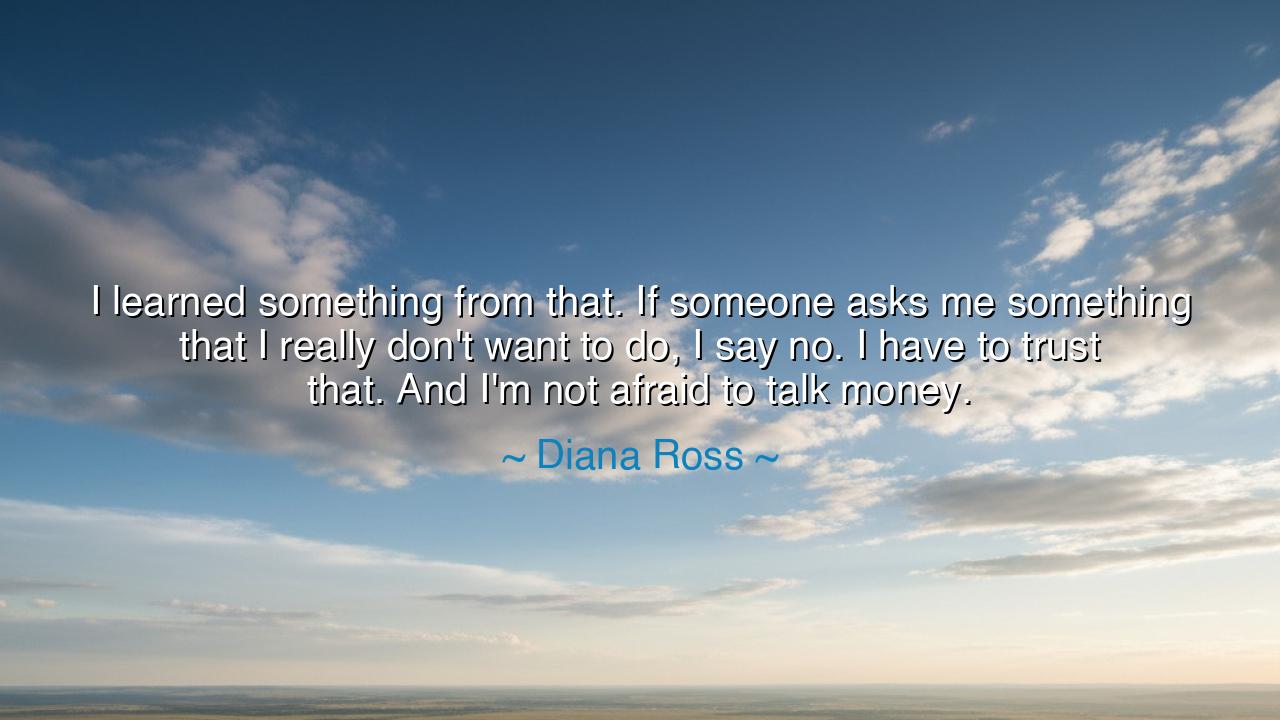
I learned something from that. If someone asks me something that
I learned something from that. If someone asks me something that I really don't want to do, I say no. I have to trust that. And I'm not afraid to talk money.






The words of Diana Ross echo with the voice of one who has walked through fire and come forth with wisdom: “I learned something from that. If someone asks me something that I really don’t want to do, I say no. I have to trust that. And I’m not afraid to talk money.” In these words is the power of self-mastery. She speaks not only as an artist but as a woman who has faced the pressures of fame, expectation, and the endless demands of others. Her words are not soft—they are edged with the strength of one who has claimed her own boundaries.
The ancients knew that the word no is sacred. To refuse what violates the soul is an act of courage, a shield against slavery of the spirit. How many kings fell because they could not say no to excess? How many heroes were undone because they bent to the will of others instead of standing firm in their truth? Ross speaks the wisdom of self-discipline, that in saying no, one preserves freedom, integrity, and the space for true creation. To always say yes is to betray oneself; to say no when needed is to honor the self.
When she speaks of trust, she means the deep inner trust—the ability to listen to the voice within and know it speaks truly. Many ignore that voice, fearing disapproval, loss, or conflict. Yet Ross reminds us that only by trusting ourselves can we walk the path of authenticity. To ignore that inner compass is to live a borrowed life, shaped by the desires of others. To trust it is to step into one’s destiny with clarity, no matter how great the opposition.
Her final truth is equally profound: “I’m not afraid to talk money.” In the ancient world, as in ours, many were enslaved not by chains but by silence about wealth, by the fear of speaking openly about the value of their labor. Artists, thinkers, even prophets often suffered because they did not dare to demand fair reward for their work. Ross declares boldly that creation has value, that one must not shrink from demanding what is just. To speak of money is not greed; it is justice, the acknowledgment that labor deserves honor, and that worth must not be hidden in false modesty.
History offers many examples of those who suffered for their silence. Consider the brilliant composer Mozart, who, though a genius, died impoverished, buried in an unmarked grave because he could not secure the financial recognition his art deserved. Contrast this with Michelangelo, who boldly negotiated his fees with popes and patrons, ensuring his genius was honored both in stone and in sustenance. Ross belongs to this lineage: the artist who understands that dignity requires not only vision but also the courage to demand fair recompense.
The deeper meaning of her words is heroic: life demands both the softness of song and the steel of refusal. To thrive, one must master both. The strength to say no protects the soul; the courage to trust protects the path; the honesty to speak of money protects the body. Without these, the artist becomes a victim, the leader becomes a servant of others’ whims, and the individual loses both dignity and freedom.
The lesson is clear: do not fear to guard your own boundaries. Say no when the request violates your heart. Trust the voice within, for it is your truest guide. Speak openly about your worth, your needs, and your value, for silence only invites exploitation. And remember: in honoring yourself, you also teach others to honor themselves.
Practical actions follow: practice saying no with calm strength, without guilt. Each day, listen for the inner voice that whispers what is right for you, and act upon it. Speak openly about compensation, about fairness, about value, whether in work, in art, or in life. And above all, trust that by living in truth, you build a life not of fear or submission, but of freedom, dignity, and song.






QKNgo Quang Khai
Diana Ross’s lesson about saying no and talking money is definitely empowering. It’s so easy to fall into the trap of agreeing to things just to please others. But I wonder if there are situations where being too direct about saying no or discussing money could cause friction. Is there a way to approach these topics without losing the respect or connection with others? How do we find that balance?
NCNgan Coii
This quote hits home for me because it highlights the importance of self-trust. Saying no can be hard, especially when we’re worried about letting others down. I’m curious, though: how do we build that level of self-trust if it doesn’t come naturally? And regarding money, how can we become more comfortable talking about it in ways that don’t come across as too blunt or tactless?
MATran Nguyen Mai Anh
I admire the confidence in Diana Ross’s approach to both setting boundaries and discussing money openly. But I wonder, in professional or personal situations, do we always feel comfortable being direct about finances? How do we overcome the cultural hesitance many people have about discussing money, especially in relationships or negotiations? Is this something that’s necessary for personal and professional growth, or does it risk alienating others?
GDGold D.dragon
Diana Ross's quote really speaks to setting boundaries, which can be so difficult for many people. It's refreshing to hear someone embrace the power of saying 'no' without guilt. But can it be that easy for everyone? How do we trust our instincts enough to say no, especially when there’s pressure from others or when we feel obligated to say yes? Is there a way to balance this confidence with empathy?